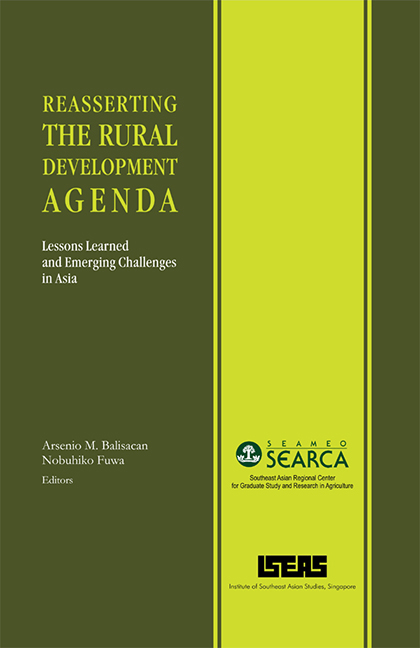Book contents
- Frontmatter
- Contents
- Tables
- Figures
- Preface
- Contributors
- 1 Challenges and Policy Options for Agricultural Development – Overview and Synthesis
- 2 The Economics of Agricultural Development: What Have We Learned?
- 3 The Role of Social Structures and Norms in Agricultural Development: Africa and East Asian Communities Compared
- 4 Food Security in a Globalised Setting
- 5 Poverty and Vulnerability
- 6 Asian Agricultural Development: From the Green Revolution to the Gene Revolution
- 7 Dryland Agriculture in Asia: Ideas, Paradigms, and Policies
- 8 Establishing Efficient Use of Water Resources in Asia
- 9 Improving the Delivery of Extension Services to Rural People: New Perspectives
- 10 Land Tenure and Forest Resource Management in Asia
- 11 Globalisation and the Poverty-Environment Link in Asian Agriculture
- 12 The Supermarket Revolution with Asian Characteristics
- Index
2 - The Economics of Agricultural Development: What Have We Learned?
Published online by Cambridge University Press: 21 October 2015
- Frontmatter
- Contents
- Tables
- Figures
- Preface
- Contributors
- 1 Challenges and Policy Options for Agricultural Development – Overview and Synthesis
- 2 The Economics of Agricultural Development: What Have We Learned?
- 3 The Role of Social Structures and Norms in Agricultural Development: Africa and East Asian Communities Compared
- 4 Food Security in a Globalised Setting
- 5 Poverty and Vulnerability
- 6 Asian Agricultural Development: From the Green Revolution to the Gene Revolution
- 7 Dryland Agriculture in Asia: Ideas, Paradigms, and Policies
- 8 Establishing Efficient Use of Water Resources in Asia
- 9 Improving the Delivery of Extension Services to Rural People: New Perspectives
- 10 Land Tenure and Forest Resource Management in Asia
- 11 Globalisation and the Poverty-Environment Link in Asian Agriculture
- 12 The Supermarket Revolution with Asian Characteristics
- Index
Summary
INTRODUCTION
At the 1995 UN Social Summit, 117 countries pledged to adopt programmes to rid themselves of extreme poverty; the UN Millennium Summit agreed to halve global poverty by 2015. According to the International Fund for Agricultural Development (IFAD 2001), these targets are not being met. Thirty million people a year should have been released from poverty for the 2015 target to be met. But, says IFAD, the figure is no more than 10 million a year, a rate of progress that makes the target unattainable. Since 75 per cent of extreme poverty occurs in rural areas, IFAD suggests that the whole question be looked at in the context of the rural world. “Current development efforts grossly and increasingly neglect agriculture and rural people,” says Dr. Michael Lipton, Director of the Poverty Research Unit at Sussex University, who co-authored the report. Between 1987 and 1998, for instance, agricultural aid to low-income or least developed countries, which account for over 85 per cent of the world's poor, shrank by two-thirds.
Since the 1980s, however, the economics of agricultural development has arguably been in decline. Donor agencies have often found agricultural development contrary to the precepts of the Washington Consensus and of even less worth in the face of low agricultural prices. Economists often leave agricultural issues to the agricultural economics profession. But development is not a high status enterprise in the departments of Agricultural and Resource Economics. This leaves agricultural development twice marginalised in the academe, and non-academic institutions are hard-pressed to fill the void, despite the heroic efforts of a few stalwart crusaders and organisations. The following review of agricultural development thinking is offered in the spirit that understanding of previous thinking may help to identify new frontiers that today's researchers will find suitably promising and challenging.
FADS AND FANCIES IN THE ECONOMICS OF AGRICULTURAL DEVELOPMENT
The economic development literature has gone through recognisable stages of fad and fancy. The 1950s and early 1960s was dominated by the planning mentality. The rest of the 1960s witnessed an era of dualism wherein the import protection of industry was justified by asserting that the marginal product of labour in agriculture was relatively low (Ranis and Fei 1961). The 1970s was the “growth with equity” decade.
- Type
- Chapter
- Information
- Reasserting the Rural Development AgendaLessons Learned and Emerging Challenges in Asia, pp. 33 - 62Publisher: ISEAS–Yusof Ishak InstitutePrint publication year: 2007

